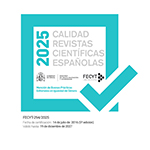Criteria for studying modality in German: typology and universals
Abstract
Modality as a linguistic phenomenon is a hotchpotch that includes the study of speakers' attitudes. However, the first basic issue when dealing with modality is to specify the object of study. In traditional grammars, modal verbs are focused on in detail; then there is sentence modality and in more recent grammars, modal connectors and particles. In the grammars of many natural languages, sentence modality is dealt with in a vague sort of way; in German linguistics, however, it has been widely studied. This paper focuses on sentence modality and particles as expressions of modality. The discussion centres on whether analysis criteria specific to the German language can be extrapolated and applied to typological and universalist linguistics.Downloads
Article download
License
In order to support the global exchange of knowledge, the journal Revista de Filología Alemana is allowing unrestricted access to its content as from its publication in this electronic edition, and as such it is an open-access journal. The originals published in this journal are the property of the Complutense University of Madrid and any reproduction thereof in full or in part must cite the source. All content is distributed under a Creative Commons Attribution 4.0 use and distribution licence (CC BY 4.0). This circumstance must be expressly stated in these terms where necessary. You can view the summary and the complete legal text of the licence.










